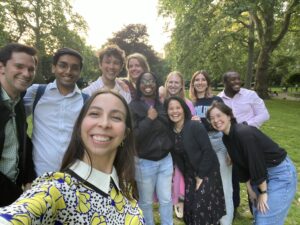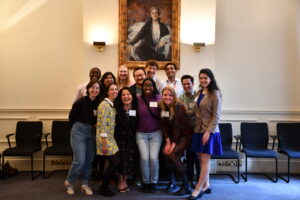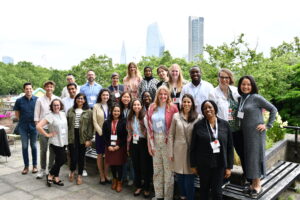Second-year Royster Fellow Ruitian Yan shares photos and stories from Royster Global in London
Monday, June 2
The group arrived in London this morning and had the pleasure of meeting some wonderful new friends from our partner universities. It was a long journey, but we all made it and are excited to kick off the conference!
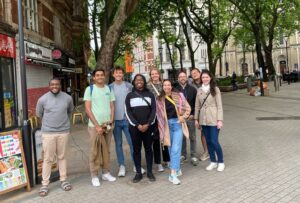
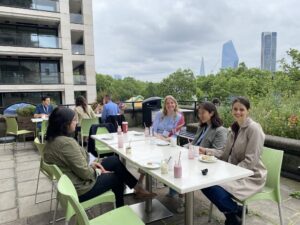
Tuesday, June 3 (First day of the conference)
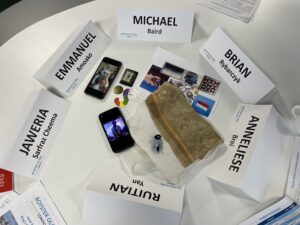
During the “Cultural Box” activity, we shared photos of objects that reminded us of our diverse communities, including family, school, religion, identity, and more. In times of vulnerability, I saw a different side of my peers. They are more than just researchers. They are devoted pet parents. They find comfort in cooking and creating art. They have adopted a spirit of exploration since childhood. They navigate complex relationships with their religions. They face cultural and political barriers as immigrants, and hold defining moments that led them to their academic paths. The picture is an assemblage of items that traveled thousands of miles to be here.
I came across a portrait of Professor ‘Funmi Olonisakin in the King’s lobby before her afternoon keynote. On the wall were portraits of King’s female faculty, who are a minority within the faculty body, and even rarer are those who are people of color. In her speech, Olonisakin advocated for action research and encouraged young scholars to critically examine their research goals and established methodologies from day one. Outside academic circles, what impacts does the research bring? She challenged us to ask questions, especially when the answers might be uncomfortable. It was incredibly inspiring to see ‘Funmi as a role model—a person of color, an immigrant, and an expert with passion, empathy and mentorship to offer.
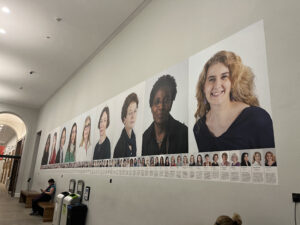
Wednesday, June 4
Workshop: Inspiring Actions Along the Continuum of Community Engagement in Research
Alita, Josh, and I co-led a workshop using a continuum framework on community engagement levels, inspired by Key et al. (2019). We started by presenting case studies to illustrate instances where community engagement was misused and abused. From the shortcomings in those cases, we discussed how community and engagement get defined, and shared the framework, explaining levels of involvement and experiences. The highlight was when we asked participants to map their research projects along the continuum framework.
The room came alive with colorful Post-it notes. Orange for healthcare, pink for social sciences/humanities, and green for STEM. It was amazing to see the variety of projects spread across the spectrum.
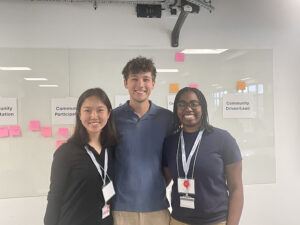
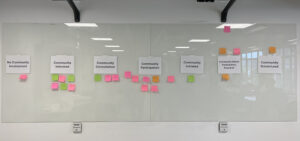
Thursday, June 5
Workshop: Design Graduate Student Success
“Designing Human-Centered Solutions for Graduate Student Success” was a workshop led by Aashka and Josh from UNC, and Nina from the University of Tübingen. During the workshop, we began by discussing what the wider world considers as success for graduate students (salary, school reputation, securing a tenure track position, and publications), and then explored what success means to us as PhD students (mental/physical health, creativity, personal fulfillment, acquiring knowledge, and ultimately completing our studies). While we acknowledge the significance of objective measures of success, we place even greater value on personal growth and well-being.
During the group activity, we collaborated on creating solutions for success. In the picture is my team, including Tani from King’s College, Jaweria from the University of Tübingen, and myself from UNC. All three of us are international students at our respective institutions. We decided to design a prototype for a structured peer mentorship program. We generated visual illustrations, as shown in the second photo, and received feedback from other groups on the program setup.
I was glad to connect with students from different backgrounds and institutions and find commonalities in what mattered most to us. I am excited to bring the inspiration back to my program at UNC!
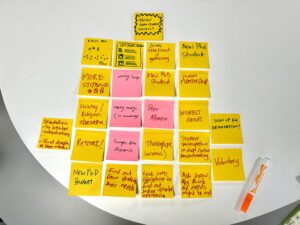
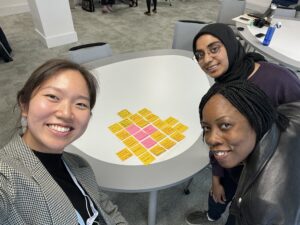
Friday, June 6
We enjoyed more amazing presentations, workshops, and panel discussions on the final day. The most touching moment was at the celebration dinner. In her remarks, Stephanie Kaczynski made a joke about our Royster group being the one she was least annoyed with, but really, she said it meant that she could fully be herself with us. I felt the same. Being among a passionate and exceptional group that is diverse in nationality, ethnicity, age and discipline, I felt welcomed and encouraged to express my opinions, even as a first-year newbie who tends to get nervous.
This would not have been possible without the incredible faculty and staff who facilitated everything from the schedule and flights to the fantastic interactions and food. As Tori Ekstrand and Laura Pratt transition out of their roles with Royster, it was beautiful to hear their heartfelt appreciation for one another, just as we all appreciate their mentorship and friendship. It was such a lovely conclusion to the conference. I can’t wait to see these wonderful people at next year’s Royster Global!
